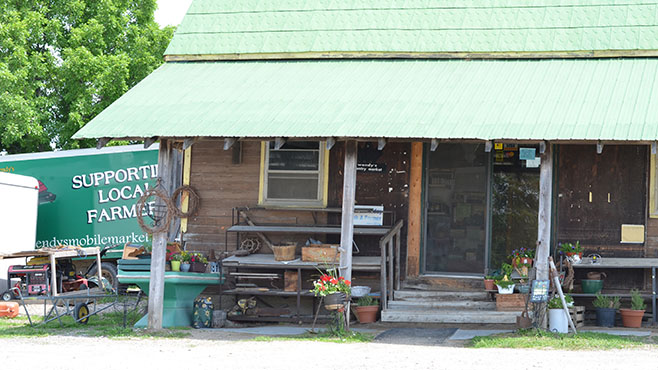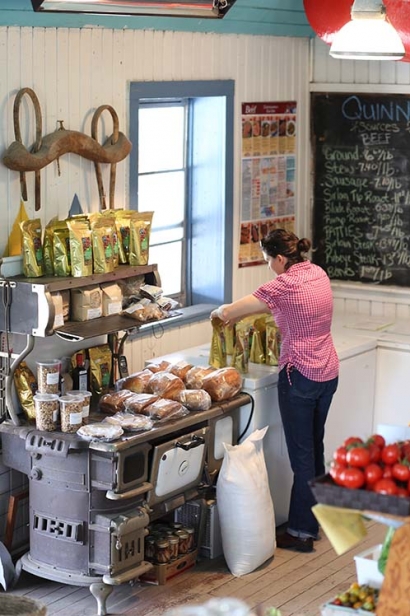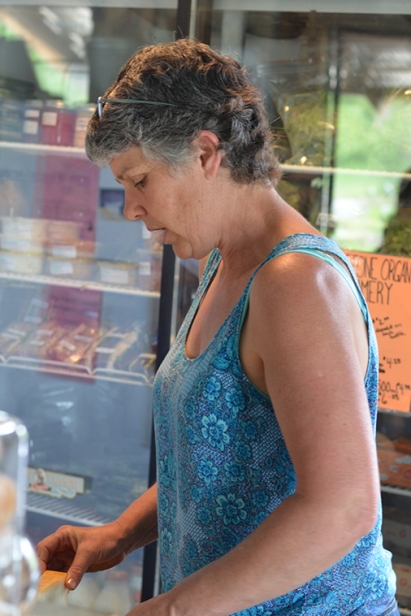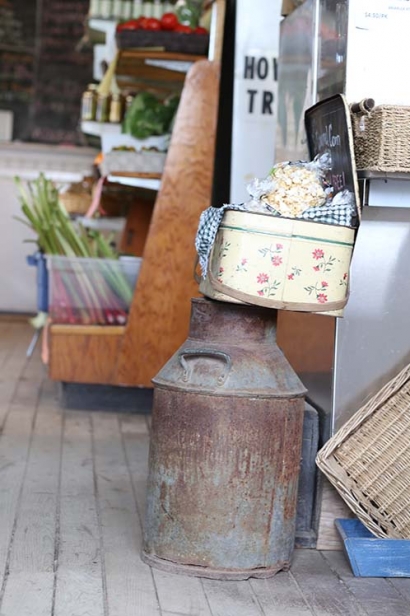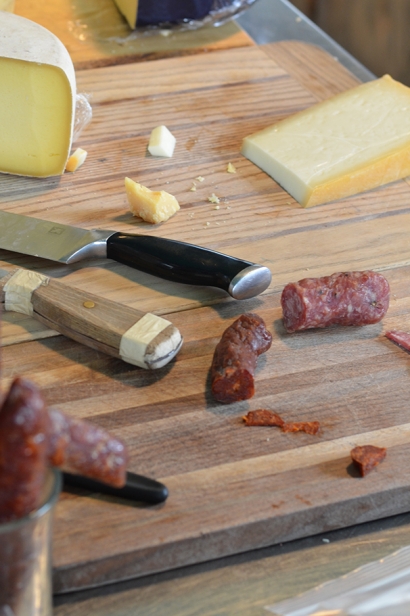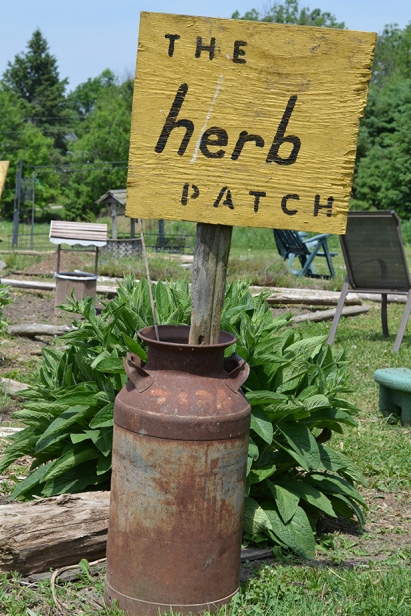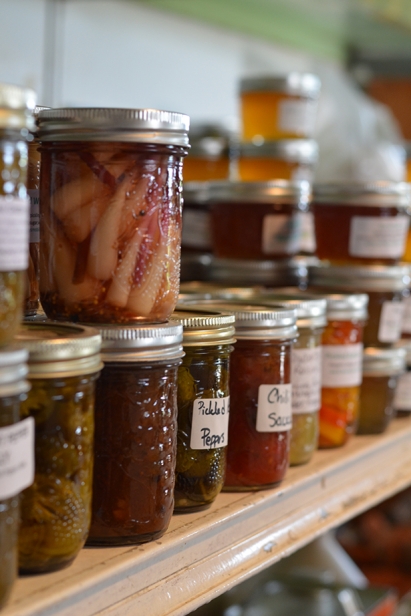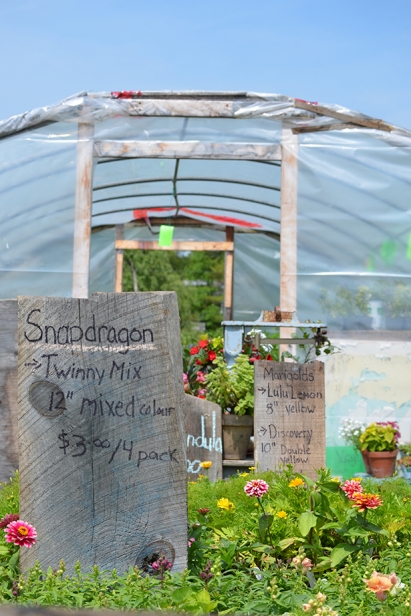Wendy's Markets
It makes sense that Wendy Banks is selling food out of an old schoolhouse. She is as much an educator as a farmer, as much a collaborator as a leader. With an insatiable appetite for local, organic, sustainably sourced food and a tenacious work ethic, Banks is bringing food to numerous restaurants and homes and shaking the hands of farmers across the Ottawa Valley as she does it.
Wendy’s Mobile Market and Wendy’s Country Market are extensions of a single idea: bringing local food to local people. While the quaint Country Market rests in Lyndhurst, Ont., Banks’ Mobile Market is always in motion, delivering farm fresh produce, meats and even homemade entrees to residences and restaurants alike. That means Banks works with upwards of 70 producers and nearly 60 restaurants within a 160-kilometre radius.
It began about eight years ago. Banks took over the 1860’s schoolhouse-turnedstore on her eighth-generation family farm. Inside Wendy’s Country Market, a crimson canoe hangs from a turquoise ceiling. "My mother painted the ceiling,” she says, “Customers always comment on it. It's funny how this colour has gone in and out and is now back into style again.” The original chalkboard lists the day's meat offerings and shows the wear of many erasers. The metal counter holding the cash register is a stunning speckling of green and gold making the red tomatoes a customer is purchasing look that much more fresh.
At the centre of it all, the cutting board acts like a kitchen table, around which customers gather to talk about health, food and look to Banks for her knowledgable opinions. As she gabs, she enjoys a few slices of chorizo and cheese with customers who are only too willing to indulge. "Sometimes, people come in here just to snack!" she whispers later, with a grin.
Banks’ love of farm-fresh food is both passionate and pragmatic. After a difficult and prolonged time dealing with an autoimmune disorder, she discovered her body responds well to detoxing and rebuilding the immune system with clean, fresh, organic food. She is a firm believer that food should not be genetically changed. “The body requires food to be what it recognizes from the past 100 years,” she explains.
Her parents' store became the perfect location to bring in the food she was searching for. In addition to the offerings from the family farm, she started sourcing meat products that she could trust from other nearby farms.
Banks watched as the Country Market became increasingly busy and demand for local food grew. Meanwhile, her mother, Gale Banks, was involved in “Frontenac Arch Biosphere (FAB) Local Flavours,” a network of food producers, markets and stores, restaurants and chefs looking to support one another and the community in all food ventures. Her mother insisted she attend a meeting and bring forward some suggestions about how to get the food from local farmers to the forks and plates of keen recipients. “I went home that evening and said to my husband, ‘Guess what? I think I figured out what we’re going to do now. We’re going to start a local food delivery business.”
Opportunity was knocking and Banks responded with an ambitious plan. With her husband, Rick Trudeau, the duo began working with restaurants, selling local edibles and helping to make farm-to-fork food a popular and viable reality. They worked with farmers, encouraging them to do winter storage. They started buying and storing food over the winter and selling it to restaurants just to prove that produce could still be bought and used in the off-season. “I wanted to see an expansion of local products. I wanted to see everyone thinking outside of the box. We were proving that our food is consistently local and consistent in quality.”
The story began with just a few farms, five to be exact, three restaurants and one van with cold storage capacities. The founding member farms included Lyons Family Turkey Farm Ltd. in Spencerville, her parent’s own Corn Acre Farms on Rideau Lakes, Roots Down Organic in Leeds and the Thousand Islands, Sonset Farms in Inverary and Patchwork Gardens in Battersea. The restaurants were Olivea and Le Chien Noir Bistro in Kingston and Smugglers Run Seafood Shack and Rum Bar in Lansdowne. Today, the business is exploding, with three vans following a weekly schedule so rigorous it is comparable to training for an Iron Man competition.
With 50 per cent of the business relying on restaurant deliveries, 20 per cent on residential deliveries (leaving 30 per cent to the country market), the schedule is intense. Sunday nights, the online forms arrive and Banks contacts her producers to ensure availability. Tuesday, they pick up the food directly from the farms in their area and do some deliveries in the Napanee area. Wednesday is commercial delivery day in Gananoque and Kingston. Thursday’s deliveries are done in Merrickville, Kemptville, Westport, Smiths Falls, Perth, Manotick and, on alternating weeks, Finch. Friday involves more deliveries and pickups in the Gananoque and Kingston area. They are hoping to expand their territory into Carleton Place and other venues in Ottawa proper.
Each delivery is peppered with pick-ups from farms along the way, as well as home deliveries. Yes, that’s right, farm-fresh produce, local meats, dairy and eggs, baking supplies … your entire grocery list can be delivered to you, including your morning coffee beans and body wash.
Not into cooking? Banks understands, “I went through this life with my parents on the farm. We want to see farm food being accessible and enjoyed everywhere.” To help you out, Wendy’s Market has its own line of healthy, homemade prepared meals (containing about 85 per cent local food), which can even be adjusted to accommodate for allergies and food sensitivities.
In addition, Wendy's has worked its way into school lunch programs. “I want to change thought patterns that are relying on industrial, processed food that has been packaged to death,” says Banks. Currently, she works with six public schools, often exposing the children to produce they might not otherwise find in their lunch bags. Banks’ chef prepares hot lunches (again, containing 85 per cent local food) and makes fresh vegetable platters. Her company also donates apples. With a gleam in her eye, Banks describes the baffled comments from parents as they observe their kids excitedly proclaiming “Oh! Watermelon radishes!” Banks’ arms go up in the air, “Yay! We did it! It’s this next generation that has to look at food differently, value food, learn how it grows … It’s that generation that is going to help things change.”
The planning for this business endeavour is no easy feat. In January, Banks begins her job, calling herself a “middle-person with a conscience.” It begins with talking to chefs and getting a sense of what sorts of ingredients they’re hoping to see in the coming growing season. “Last year, it was anything purple,” she explains. Armed with requests, she meets with producers to let them know what’s hot in the industry and see if they can actually grow it. “It’s complicated,” she explains, “as some chefs will only want certain products from certain producers. I’m the one that will go to the farmers and ask, ‘Can you grow this or that?’ to see if it can actually happen.”
It is indeed happening.
“Now, if a restaurant asks us to find something, I can get somebody to grow it,” Banks says. With her hands in so much food business, she has a pulse on the local food scene, how far it has come and where she feels it is headed. “During the ’80s and ’90s, nobody cared about local food. It was about convenience [and big] box stores. Then the baby boomers’ kids woke up and said ‘Hey! Things aren’t working here!’”
That’s when the food scene started evolving.
“The only way to change is to create something different,” she says. She points to Limestone Creamery, and the way they have branded their milk products, as an example. Stepping out of the dairy mega-farming industry, Limestone has created, and is successfully marketing, a single-source milk product — that is, it is processing its own organic milk on its own property. Banks sums this and the product up in one word: “phenomenal.”
Upping the ante on what is available locally in the winter season will also continue to be the next best thing. “Winter is the new.” Banks says, “It’s moving past just ‘what have you got’ and into ‘who’s got it’…and even better… ‘who’s growing it in winter?’”
Patchwork Gardens is Banks’ example of winter’s possibilities. She describes how it was one of the first farms to build its own cold storage. As a result, Wendy’s Mobile Market was able to continue to do weekly deliveries of its products through the cold seasons. Patchwork’s farmers also installed a large, more efficient machine for washing beets and designed prelabelled retail bags, making their product easily marketable. “They’ve got it,” Banks reports, “They are selling these beets that taste like they were picked yesterday, all winter long. The size and colour are perfect … candy cane, golden, purple.”
With more producers willing to try new methods of growing and marketing their products and Banks ready to deliver, the next step in the growth of the local food industry lies with the customers.
“I want to make sure people have choice,” Banks says, commenting on her mission to educate. “A lot of people don’t ask questions and I am always on them. You know what, to be able to have a safeguarded food system, you need to ask questions. I think people need to be accountable for what they do and people need to be accountable for what food is.”


